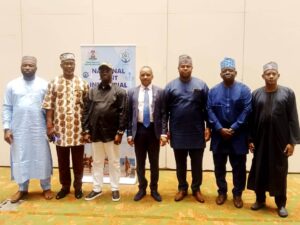By Oluyinka Onigbinde and Joshua Yousouph
The Director General of the Nigerian Maritime Administration and Safety Agency (NIMASA) has stated that the remuneration of Nigeria seafarers is not a charity fund, but their legitimate rights. This is even as the National Joint Industrial Council (NJIC) has reviewed and negotiated the minimum standard for seafarers.

Jamoh while speaking on Wednesday during the inauguration of the Tripartite National Joint Industrial Council (NJIC) meeting for the review of minimum standards for Nigerian Seafarers being hosted by the Agency and held in Lagos.
The NIMASA DG informed that a revised working condition for Nigerian seafarers is a major component of the proposed review of the NIMASA Act and the Merchant Shipping Act currently before the National Assembly for consideration.
Jamoh noted that the minimum standard through the instrument of the Collective Bargaining Agreement (CBA) defines the conditions and responsibilities of both the employers and seafarers as well as the remuneration, sanctions, discipline and rewards involved.
The Director General said there have been discriminations by the employers of Nigerian seafarers, adding that the indigenous employers have been adamant in implementing the CBA. .
He noted that there is a need to review the NIMASA Act and Merchant Shipping Act to ensure Nigeria seafarers are given their entitlements. The DG however charged employers of seafarers to prioritize the welfare of Nigerian seafarers and adhere strictly to the CBA which states the condition of service.
He said, “The on-going review by the NJIC is timely because it comes at a time when we are in the process of reviewing both the NIMASA Act and the Merchant Shipping Act with the outcomes of the tripartite negotiations by the NJIC to be inputted into both Amendments to ensure that they are binding”.
“The importance of this gathering is determined by the need for adequate compensation, remuneration and workplace conditions for Nigerian Seafarers, and for employers of labour to ensure responsible Conditions of Service guiding seafarer employment in line with global best practices’ ‘, he added.
Recall that NIMASA had previously led negotiations alongside the NJIC, Maritime Workers Union of Nigeria (MWUN) and relevant stakeholders to increase dock workers’ wages and entitlements through the Collective Bargaining Agreement (CBA) initiative in 2018 which resulted in improved conditions for Nigerian dockworkers.
Also speaking at the event, the Executive Director Maritime Labour and Cabotage Services, Engr. Victor Ochei, who also serves as the Chairman of the NJIC, emphasized on the benefits of the ongoing review for the Nigerian Maritime sector as a whole.
In his words: “Thus far, the regulation of the minimum standards of living and working condition of seafarers through the instrument of the Collective Bargaining Agreement process has created a harmonious working relationship between stakeholders, seafarer employers and the workers in the nation’s maritime labour sector”.
“A review of the Collective Bargaining Agreement is needed for improved wages and living standards for Seafarers operating in Nigeria’s in territorial waters, who undoubtedly are an integral part of the maritime
On his part, the President General of the Maritime Workers’ Union of Nigeria (MWUN), Comrade Adewale Adeyanju berated the negligent attitude of some employers of seafarers among which are the ship owners towards the review of Minimum Standard for Nigerian Seafarers.
Adeyanju noted that aged seafarers who worked for the defunct Nigerian National Shipping Line (NNSL) have been neglected and un-catered for, and some wallowing in abject poverty after serving the country’s maritime industry for many years.
Read Also: ANLCA Visits Lekki Deep Seaport, Calls For Total Automation Of Port Activities
Adeyanju urged the DG of NIMASA and the Director of Maritime Labour and Cabotage Services of the agency to stand up for the seafarers by ensuring they are all paid their legitimate entitlements.
“Those aged seafarers have contributed immensely to seafaring in this great country. Where are they today? Where is their right? But with the coming up of NIJC, I believe those issues will be discussed during the technical session. I want to urge the DG, through the office of the Executive Director, Maritime Labour and Cabotage Services, that the privileges of the aged seafarers be considered.
“We have done it in the past and we are still appealing to the DG that those seafarers, because what we are hearing is that they don’t have letter of employment but letter of employment can be determined by the discharged books if the government have the love of those seafarers in their heart” Adeyanju said.
Also Speaking, the National President of the Nigeria Merchant Navy Officers and Water Transport Senior Staff Association (NMNOWTSSA), Engr, Bob Yousou lamented that about 50 to 60 percent of ship owners are not complying to the Collective Bargaining Agreement when dealing with Nigeria seafarers. According to him, many Nigerian seafarers are poorly treated and remunerated as a result of this.
Yousou stressed that beyond the review of the minimum standards, all regulatory agencies should put all hands on deck to ensure the agreements and resolutions are fully enforced and complied with by all relevant employers of labour.
Kindly like us on Facebook/twitter















